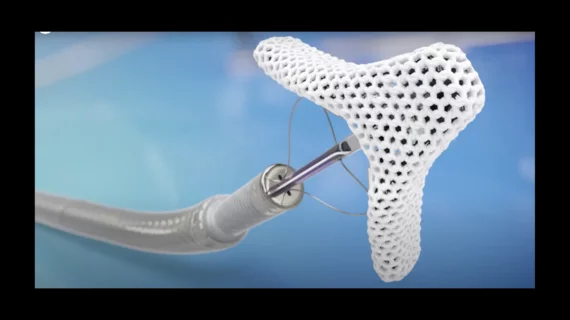FDA panel to consider Abbott’s TriClip device for tricuspid regurgitation
Members of a U.S. Food and Drug Administration (FDA) advisory panel are meeting Tuesday, Feb. 13, to discuss the potential approval of Abbott’s TriClip G4 transcatheter edge-to-edge repair (TEER) system for severe tricuspid regurgitation (TR).
The Circulatory System Devices Panel reviews data related to the safety and effectiveness of various medical devices related to circulatory and vascular health. The panel’s recommendations typically provide a preview of the FDA’s final decisions, though that is not always necessarily the case.
Tuesday’s meeting—scheduled to take place virtually from 9 a.m. to 6 p.m.—will be focused on Abbott’s premarket approval (PMA) application for the TriClip G4 System. If Abbott’s TEER system ends up eventually gaining the FDA’s approval, it would represent a second treatment option for a patients presenting with TR; Edwards made history just days ago when the FDA approved its Evoque transcatheter tricuspid valve replacement device for TR.
According to the FDA’s executive summary, Abbott’s PMA for the TriClip G4 System is primarily supported by data from the TRILUMINATE trial, which included 350 patients randomized to either undergo TEER with TriClip or guideline-directed medical therapy.
A quick look at TRILUMINATE
Overall, the TRILUMINATE study’s primary endpoint—a hierarchical composite that included all-cause mortality, tricuspid valve surgery, heart failure hospitalization and quality of life (QOL) improvements after one year—favored treatment with TEER. However, there were no significant differences when it came to all-cause mortality/tricuspid valve surgery or heart failure hospitalizations. The primary difference was related to QOL improvements as measured by the Kansas City Cardiomyopathy Questionnaire (KCCQ).
In terms of safety, TriClip was more of a runaway success; more than 98% of patients were free from major adverse events after 30 days.
Click here to read the full results in the New England Journal of Medicine.
TRILUMINATE principal investigator: ‘An incredibly safe procedure’
Paul Sorajja, MD, a cardiologist with the Minneapolis Heart Institute, was TRILUMINATE’s principal investigator. He discussed the study at length with Cardiovascular Business at ACC.23, emphasizing that TR patients have historically had “very few options” when it comes to treatment.
“This is an incredibly safe procedure, and that is really important because the alternative of surgery in these patients really carries significant risk,” he said at the time.
What will the FDA panel recommend?
It is unclear how the FDA advisory panel will ultimately rule. While the device is clearly associated with consistent safety and QOL improvements, the comparable mortality/tricuspid valve surgery rates suggest treatment with the TriClip device is not necessarily as impactful as the FDA may want it to be.
More information about Tuesday’s meeting is available here.

